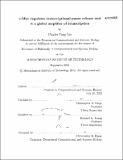c-Myc regulates transcriptional pause release and is a global amplifier of transcription
Author(s)
Lin, Charles Yang
DownloadFull printable version (16.45Mb)
Other Contributors
Massachusetts Institute of Technology. Computational and Systems Biology Program.
Advisor
Christopher B. Burge and Richard A. Young.
Terms of use
Metadata
Show full item recordAbstract
Elevated expression of the c-Myc transcription factor occurs frequently in human cancers and is associated with tumor aggression and poor clinical outcome. However, the predominant mechanism by which c-Myc regulates global transcription in both healthy and tumor cells is poorly understood. In this thesis, I present evidence that c-Myc is a global regulator of RNA Polymerase II (RNA Pol II) transcriptional pause release. Transcriptional pausing occurs when additional regulatory steps are required to promote elongation of genes after transcription has initiated. Chapter 2 identifies transcriptional pausing as a general feature of transcription by RNA Pol II in mammalian cells. c-Myc is identified as having a major role in promoting release from pause at its target genes. Chapter 3 finds in tumor cells with elevated c-Myc, the transcription factor binds to promoters and enhancers of most actively transcribed genes. The predominant effect of c-Myc binding is to produce higher levels of transcription by promoting RNA Pol II transcriptional pause release. Thus, c-Myc accumulates in the promoter regions of active genes across the cancer cell genome and causes transcriptional amplification, producing increased levels of transcripts within the cells gene expression program. These results imply that transcriptional amplification can reduce rate-limiting constraints for tumor cell growth and proliferation.
Description
Thesis (Ph. D.)--Massachusetts Institute of Technology, Computational and Systems Biology Program, 2012. Cataloged from PDF version of thesis. Includes bibliographical references (p. 203-226).
Date issued
2012Department
Massachusetts Institute of Technology. Computational and Systems Biology ProgramPublisher
Massachusetts Institute of Technology
Keywords
Computational and Systems Biology Program.